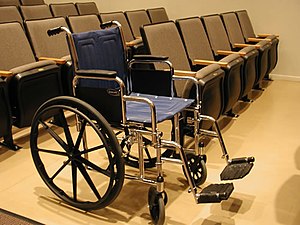By Michael Smith, North American Correspondent, MedPage Today
Hearing loss appears to be associated with an increased risk of developing dementia, researchers reported.
In a prospective analysis of more than 600 people free of cognitive decline, the risk of all-cause dementia rose 27% for every 10-decibel loss of hearing at the start of the almost 12-year study, according to Frank Lin, MD, PhD, of the Johns Hopkins School of Medicine, and colleagues.
The risk of Alzheimer's rose in a similar fashion, but did not reach statistical significance, Lin and co-authors reported in the February issue of Archives of Neurology.
The findings support the notion that the social isolation caused by deafness may be part of the cause of dementia, Lin and colleagues argued -- especially since the association was only seen for deafness above the level at which verbal communication is impaired.
Full Article
This blog tracks aging and disability news. Legislative information is provided via GovTrack.us.
In the right sidebar and at the page bottom, bills in the categories of Aging, Disability, Medicare, Medicaid, and Social Security are tracked.
Clicking on the bill title will connect to GovTrack updated bill status.
Showing posts with label Hearing impairment. Show all posts
Showing posts with label Hearing impairment. Show all posts
Tuesday, February 15, 2011
Wednesday, January 12, 2011
Tinnitus Treatment: Rebooting the Brain Helps Stop the Ring of Tinnitus in Rats
ScienceDaily (2011-01-12) -- Targeted nerve stimulation could yield a long-term reversal of tinnitus, a debilitating hearing impairment affecting at least 10 percent of senior citizens and up to 40 percent of military veterans, according to a new article.
Saturday, October 9, 2010
Obama signs technology access bill for disabled
 Image via CrunchBaseBy DARLENE SUPERVILLE -The Associated Press
Image via CrunchBaseBy DARLENE SUPERVILLE -The Associated PressBlind and deaf people will be able to more easily use smart phones, the Internet and other technologies that are staples of life and work under a bill signed into law on Friday.
Such a step has been a priority of advocates for the millions of people who cannot see or hear.
Full Article
Friday, June 25, 2010
How Do Deaf Blind People Communicate?
by Tom Babinszki
In an earlier post, I have written about how a deaf blind person does her daily tasks with the help of assistive technology. Let us now focus more on the communication devices that deaf blind people use to connect with other people and exchange information with the world around them.
There are many ways for deaf blind people to communicate. The methods that they use vary with the degree or combination of their vision and hearing loss, their background, and education. And with the recent advancements in assistive technology, deaf blind people are now finding more ways to connect with other people, whether they are sitting side-by-side or kilometers apart.
Continue Reading
======================================================
Additional Resources:
Words in My Hands: A Teacher, a Deaf-Blind Man, an Unforgettable Journey
In an earlier post, I have written about how a deaf blind person does her daily tasks with the help of assistive technology. Let us now focus more on the communication devices that deaf blind people use to connect with other people and exchange information with the world around them.
There are many ways for deaf blind people to communicate. The methods that they use vary with the degree or combination of their vision and hearing loss, their background, and education. And with the recent advancements in assistive technology, deaf blind people are now finding more ways to connect with other people, whether they are sitting side-by-side or kilometers apart.
Continue Reading
======================================================
Additional Resources:
Words in My Hands: A Teacher, a Deaf-Blind Man, an Unforgettable Journey
Monday, May 31, 2010
Sign Language Used in Technology

We all know that sign language is used by people who are deaf and hard of hearing to communicate with other persons. But while this form of communication is essential to this group, only a small percentage of hearing people know this language.
To address this issue, developers of technologies have created ways to use sign language in software and similar products. Below we offer a glimpse of some of these assistive technologies. You may be surprised by how innovative these products are.
Continue Reading
Friday, March 5, 2010
Making Broadway Accessible for the Disabled - ArtsBeat Blog - NYTimes.com
 Image via Wikipedia
Image via Wikipedia
The next time you complain about not being able to see the stage from the nosebleed sections of a Broadway theater, think about not being able to see the stage at all.
“No one wants to feel left out of a performance,” said Lisa Carling, the director of the Theater Development Fund’s accessibility program, which offers assistance to theatergoers with physical disabilities. “If you miss a punchline or a dramatic statement, everyone else is included but you are not.”
The Theater Development Fund, which also runs the city’s TKTS discount ticket booths, helps coordinate services for the blind or those with low vision, the deaf or hard of hearing and patrons who can’t climb stairs or need wheelchair seating.
“When we started 13 years ago, advocates for the disabled came to us and said, ‘Please, I haven’t been able to go to the theater for years because my hearing has deteriorated,’” said Ms. Carling. “People were staying away from the theater.”
Ms. Carling recently spoke to The Times about what kinds of services the TDF Accessibility Program, or TAP, offers to the disabled. Following are excerpts from her conversation. Continue Reading
Thursday, February 18, 2010
Orthopedic Institute of Pennsylvania to Ensure Effective Communication with Deaf and Hard-of-Hearing Patients
 Image via Wikipedia
Image via Wikipedia
An HHS Office for Civil Rights (OCR) investigation of a discrimination complaint filed by a deaf individual found that he was denied a necessary sign language interpreter when he called to schedule a medical appointment, in violation of Section 504 of the Rehabilitation Act of 1973. Under Section 504, recipients of HHS funding, like OIP, must provide auxiliary aids and services, including qualified interpreters, to qualified persons with disabilities, when necessary to provide an equal opportunity to benefit from their services.
The Orthopedic Institute of Pennsylvania is an orthopedic surgical practice, with 127 staff in six offices. As a result of the Agreement with OCR, when someone who is deaf or hard-of-hearing requests an interpreter, OIP staff will consult with the person to determine an appropriate auxiliary aid and provide an interpreter free of charge when necessary to ensure effective communication. A copy of the Settlement Agreement and OCR's Letter of Findings can be found at http://www.hhs.gov/ocr/civilrights/activities/agreements/index.html. For more information about OCR's civil rights enforcement activities see http://www.hhs.gov/ocr/civilrights/resources/specialtopics/hospitalcommu nication/index.html
Wednesday, January 27, 2010
Florida Commits to Provide Effective Communication for Deaf and Hard-of-Hearing Persons
 Image via Wikipedia
Image via Wikipedia
An HHS Office for Civil Rights (OCR) investigation found that the State violated Federal discrimination laws when it failed to provide interpreters to deaf persons in critical situations, such as during child protective services investigations, and during treatment in State mental health facilities. Access to quality health care and social services programs are directly dependent on effective communication.
Continue Reading
Subscribe to:
Posts (Atom)






![Reblog this post [with Zemanta]](http://img.zemanta.com/reblog_b.png?x-id=f7985da6-5c79-4017-bcec-e2701d84bc3b)
![Reblog this post [with Zemanta]](http://img.zemanta.com/reblog_b.png?x-id=ad54861e-4d06-4243-bacf-73d5ba711df4)
![Reblog this post [with Zemanta]](http://img.zemanta.com/reblog_b.png?x-id=4b7d6ed6-2dac-4294-9236-f2ae228b4ea8)
![Reblog this post [with Zemanta]](http://img.zemanta.com/reblog_b.png?x-id=a75757b4-9daf-4852-800e-04eea12cea82)